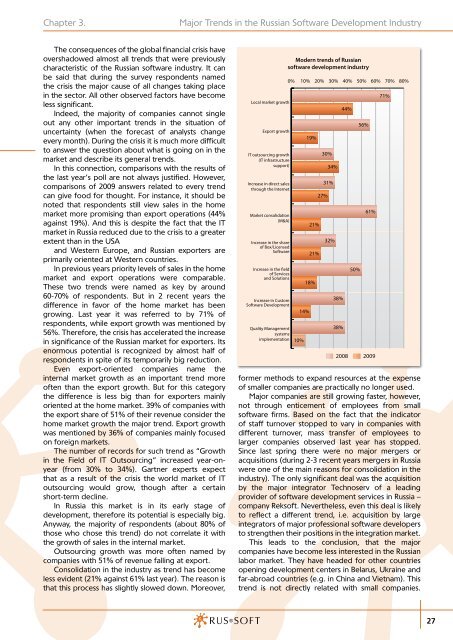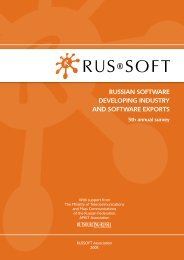russian software developing industry and software exports
russian software developing industry and software exports
russian software developing industry and software exports
Create successful ePaper yourself
Turn your PDF publications into a flip-book with our unique Google optimized e-Paper software.
Chapter 3.<br />
Major Trends in the Russian Software Development Industry<br />
The consequences of the global financial crisis have<br />
overshadowed almost all trends that were previously<br />
characteristic of the Russian <strong>software</strong> <strong>industry</strong>. It can<br />
be said that during the survey respondents named<br />
the crisis the major cause of all changes taking place<br />
in the sector. All other observed factors have become<br />
less significant.<br />
Indeed, the majority of companies cannot single<br />
out any other important trends in the situation of<br />
uncertainty (when the forecast of analysts change<br />
every month). During the crisis it is much more difficult<br />
to answer the question about what is going on in the<br />
market <strong>and</strong> describe its general trends.<br />
In this connection, comparisons with the results of<br />
the last year’s poll are not always justified. However,<br />
comparisons of 2009 answers related to every trend<br />
can give food for thought. For instance, it should be<br />
noted that respondents still view sales in the home<br />
market more promising than export operations (44%<br />
against 19%). And this is despite the fact that the IT<br />
market in Russia reduced due to the crisis to a greater<br />
extent than in the USA<br />
<strong>and</strong> Western Europe, <strong>and</strong> Russian exporters are<br />
primarily oriented at Western countries.<br />
In previous years priority levels of sales in the home<br />
market <strong>and</strong> export operations were comparable.<br />
These two trends were named as key by around<br />
60-70% of respondents. But in 2 recent years the<br />
difference in favor of the home market has been<br />
growing. Last year it was referred to by 71% of<br />
respondents, while export growth was mentioned by<br />
56%. Therefore, the crisis has accelerated the increase<br />
in significance of the Russian market for exporters. Its<br />
enormous potential is recognized by almost half of<br />
respondents in spite of its temporarily big reduction.<br />
Even export-oriented companies name the<br />
internal market growth as an important trend more<br />
often than the export growth. But for this category<br />
the difference is less big than for exporters mainly<br />
oriented at the home market. 39% of companies with<br />
the export share of 51% of their revenue consider the<br />
home market growth the major trend. Export growth<br />
was mentioned by 36% of companies mainly focused<br />
on foreign markets.<br />
The number of records for such trend as “Growth<br />
in the Field of IT Outsourcing” increased year-onyear<br />
(from 30% to 34%). Gartner experts expect<br />
that as a result of the crisis the world market of IT<br />
outsourcing would grow, though after a certain<br />
short-term decline.<br />
In Russia this market is in its early stage of<br />
development, therefore its potential is especially big.<br />
Anyway, the majority of respondents (about 80% of<br />
those who chose this trend) do not correlate it with<br />
the growth of sales in the internal market.<br />
Outsourcing growth was more often named by<br />
companies with 51% of revenue falling at export.<br />
Consolidation in the <strong>industry</strong> as trend has become<br />
less evident (21% against 61% last year). The reason is<br />
that this process has slightly slowed down. Moreover,<br />
Local market growth<br />
Export growth<br />
IT outsourcing growth<br />
(IT infrastructure<br />
support)<br />
Increase in direct sales<br />
through the Internet<br />
Market consolidation<br />
(M&A)<br />
Increase in the share<br />
of Box/Licensed<br />
Software<br />
Increase in the field<br />
of Services<br />
<strong>and</strong> Solutions<br />
Increase in Custom<br />
Software Development<br />
Quality Management<br />
systems<br />
implementation<br />
Modern trends of Russian<br />
<strong>software</strong> development <strong>industry</strong><br />
0% 10% 20% 30% 40% 50% 60% 70% 80%<br />
10%<br />
14%<br />
19%<br />
21%<br />
21%<br />
18%<br />
30%<br />
27%<br />
34%<br />
31%<br />
32%<br />
38%<br />
38%<br />
44%<br />
2008<br />
50%<br />
56%<br />
61%<br />
2009<br />
71%<br />
former methods to exp<strong>and</strong> resources at the expense<br />
of smaller companies are practically no longer used.<br />
Major companies are still growing faster, however,<br />
not through enticement of employees from small<br />
<strong>software</strong> firms. Based on the fact that the indicator<br />
of staff turnover stopped to vary in companies with<br />
different turnover, mass transfer of employees to<br />
larger companies observed last year has stopped.<br />
Since last spring there were no major mergers or<br />
acquisitions (during 2-3 recent years mergers in Russia<br />
were one of the main reasons for consolidation in the<br />
<strong>industry</strong>). The only significant deal was the acquisition<br />
by the major integrator Technoserv of a leading<br />
provider of <strong>software</strong> development services in Russia –<br />
company Reksoft. Nevertheless, even this deal is likely<br />
to reflect a different trend, i.e. acquisition by large<br />
integrators of major professional <strong>software</strong> developers<br />
to strengthen their positions in the integration market.<br />
This leads to the conclusion, that the major<br />
companies have become less interested in the Russian<br />
labor market. They have headed for other countries<br />
opening development centers in Belarus, Ukraine <strong>and</strong><br />
far-abroad countries (e.g. in China <strong>and</strong> Vietnam). This<br />
trend is not directly related with small companies.<br />
27








